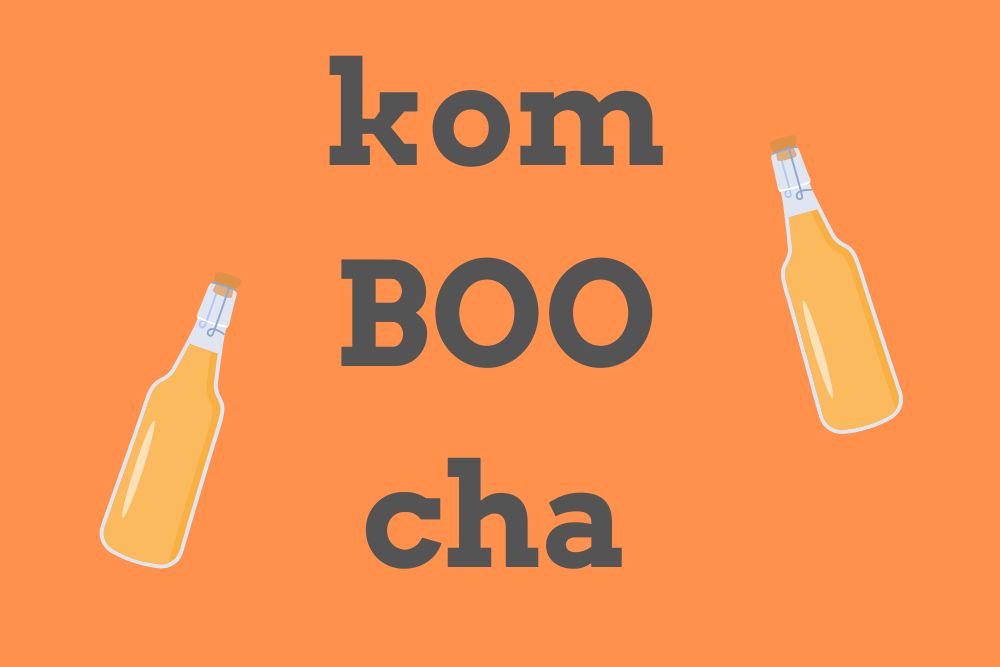The correct pronunciation of kombucha is kom-BOO-cha. Kombucha has been around for about 2,000 years. Its name translates to ‘tea for immortality.’
Table of Contents
Is There More Than One Way to Pronounce ‘Kombucha’?
Though people may experiment with different kombucha pronunciations, the correct pronunciation is kom-BOO-cha.
What Is Kombucha?
Kombucha is a fermented tea.
It contains live cultures, antioxidants, and acids with many health benefits. Kombucha may help gut health, assist in weight loss, and strengthen the immune system. Authentic kombucha is raw and unpasteurized. It is full of good bacteria and probiotics.

Kombucha is made from either sweetened black or green tea and fermented with a SCOBY for several days.
It is bottled and left to second ferment for three to five more days until it is slightly carbonated. It can be fermented a second time with fruit or herbs to add different flavors.
Which Other Languages Pronounce ‘Kombucha’ the Same as English?
French and Spanish pronounce kombucha the same way as the English pronunciation. Kombucha is becoming popular in many countries, as many people are learning the health benefits of kombucha tea.
Here’s how other countries refer to kombucha:
Italian: kampuchea
Polish: kombucza
Portuguese: kombusha
Russian: Чайный гриб (tea mushroom)
Turkish: kombu çayı
Where Was Kombucha Invented?
Kombucha originated in China.
Scientists have found evidence of this fermented drink as far back as the Qin Dynasty in early 200 B.C.
Legend has it that Emporer Qin Shui Huang wanted to extend his life, and an alchemist brought this beverage. Scientists have discovered records referring to this fermented tea as the ‘tea for immortality.’
How Do the Chinese Pronounce ‘Kombucha’?
The Chinese pronounce kombucha as ‘hong-cha-chin’ (红茶菌).
Hong-cha-chin translates to ‘black tea mushroom.’ Kombucha is usually made from black tea, and many people think the SCOBY looks like a mushroom. Though it is unrelated, this is likely where the name comes from.
Etymology of the Word ‘Kombucha’
There are two stories for the etymology of kombucha:
- The first part of the word, kombu, likely comes from the Japanese word for seaweed. Kombucha has no seaweed, but English speakers may have confused kombucha for a popular Japanese kelp tea ‘kon-bu-cha. The second part of the word, cha or chah, means ‘tea’ in many languages. Thus, the popular drink was coined ‘kombucha.’
- Korean physician Dr. Kombu brought fermented tea to Japan for Emperor Inkyo in 414 A.D as a medicinal drink. The fermented beverage was named ‘kombucha’ after the physician and the word for tea (cha 차).
Bonus: How to Pronounce SCOBY
A SCOBY makes kombucha what it is—a tea full of probiotics. A kombucha SCOBY, pronounced sk-OH-bee, is a symbiotic culture of bacteria and yeast. A SCOBY looks like a white pancake or a mushroom and either sits on top of the brew or floats in the brew while it is fermenting.

The sediment you see at the bottom of your store-bought raw kombucha is like a pre-SCOBY, made from yeast and bacteria.
You can use this sediment to grow your own SCOBY if you’d like. If your tea doesn’t have this sediment, it has probably been filtered or pasteurized. It is still drinkable and delicious but contains less gut-healthy bacteria.

